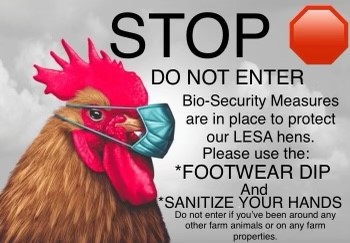There’s exclusive access and pre-entry sanitization to the Rent the Chicken farm, east of Bowden.

This is their second season offering rentals — bringing coops, hens and fresh eggs to urban backyards.
“After they try it out they fall in love with them,” said owner, Cheryl Wozny.
Urban hen programs are growing across Canada, including in Calgary where 100 licenses were approved just last week — a move some suggest is ill-timed as avian flu takes an unprecedented toll on the poultry industry.
“I think that there’s casualness, about this issue, as though, ‘you know, avian flu doesn’t affect these birds,’ but indeed it does,” said Liz White, leader of the Animal Protection Party of Canada. The group has been campaigning for municipalities to “err on the side of caution” when approving urban hen programs.
While chicken farms have seen most of the infections, there have also been cases in small flocks, including backyard hens.
“If they have access to wild birds. If they have access to bodies of water that wild birds have access to… basically once they’re outdoors, they’re at a higher risk right now,” said Teryn Girard, a poultry veterinarian with Prairie Livestock Veterinarians.
The City of Calgary says mandatory training for urban hen license holders covers avian flu prevention measures. That includes a requirement to keep birds in a fully enclosed run, limiting access to the hens and using designated footwear.

“If they don’t have any open water on their property then it’s not a big risk, especially if it’s in urban centres,” said Wozny.
Rent the Chicken only gets its chickens from trusted sources and not from backyard flocks. Wozny added that she also now briefs her renters on preventative measures.
“We just let our renters know that they shouldn’t have chicken playdates,” she said. “They shouldn’t expose their rental chickens to other chickens.”
Other urban hen owners in Calgary have gone as far as to keep their birds inside until the risk subsides.
The Canadian Food Inspection Agency is strongly recommending owners confine their birds for the duration of the migration period, which is expected to last until June.


Comments